第十届翻译竞赛原文文档
翻译竞赛英译汉参赛原文
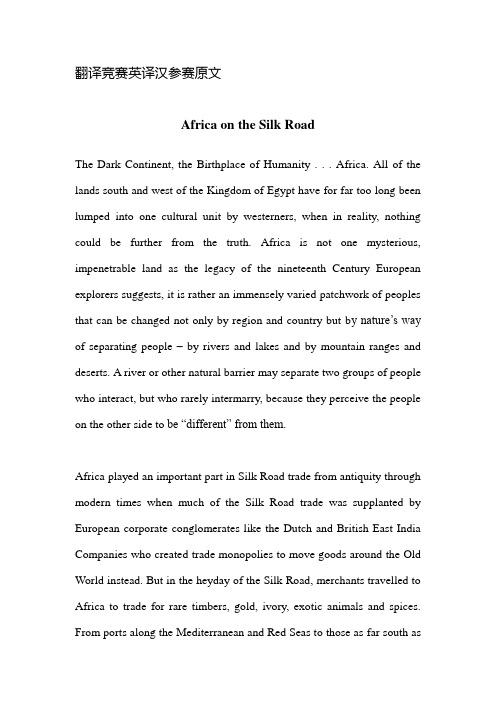
翻译竞赛英译汉参赛原文Africa on the Silk RoadThe Dark Continent, the Birthplace of Humanity . . . Africa. All of the lands south and west of the Kingdom of Egypt have for far too long been lumped into one cultural unit by westerners, when in reality, nothing could be further from the truth. Africa is not one mysterious, impenetrable land as the legacy of the nineteenth Century European explorers suggests, it is rather an immensely varied patchwork of peoples that can be changed not only by region and country but b y nature‟s way of separating people – by rivers and lakes and by mountain ranges and deserts. A river or other natural barrier may separate two groups of people who interact, but who rarely intermarry, because they perceive the people on the other side to be “different” from them.Africa played an important part in Silk Road trade from antiquity through modern times when much of the Silk Road trade was supplanted by European corporate conglomerates like the Dutch and British East India Companies who created trade monopolies to move goods around the Old World instead. But in the heyday of the Silk Road, merchants travelled to Africa to trade for rare timbers, gold, ivory, exotic animals and spices. From ports along the Mediterranean and Red Seas to those as far south asMogadishu and Kenya in the Indian Ocean, goods from all across the continent were gathered for the purposes of trade.One of Africa‟s contributions to world cuisine that is still widely used today is sesame seeds. Imagine East Asian food cooked in something other than its rich sesame oil, how about the quintessential American-loved Chinese dish, General Tso‟s Chicken? How …bout the rich, thick tahini paste enjoyed from the Levant and Middle East through South and Central Asia and the Himalayas as a flavoring for foods (hummus, halva) and stir-fries, and all of the breads topped with sesame or poppy seeds? Then think about the use of black sesame seeds from South Asian through East Asian foods and desserts. None of these cuisines would have used sesame in these ways, if it hadn‟t been for the trade of sesame seeds from Africa in antiquity.Given the propensity of sesame plants to easily reseed themselves, the early African and Arab traders probably acquired seeds from native peoples who gathered wild seeds. The seeds reached Egypt, the Middle East and China by 4,000 –5,000 years ago as evidenced from archaeological investigations, tomb paintings and scrolls. Given the eager adoption of the seeds by other cultures and the small supply, the cost per pound was probably quite high and merchants likely made fortunes offthe trade.Tamarind PodsThe earliest cultivation of sesame comes from India in the Harappan period of the Indus Valley by about 3500 years ago and from then on, India began to supplant Africa as a source of the seeds in global trade. By the time of the Romans, who used the seeds along with cumin to flavor bread, the Indian and Persian Empires were the main sources of the seeds.Another ingredient still used widely today that originates in Africa is tamarind. Growing as seed pods on huge lace-leaf trees, the seeds are soaked and turned into tamarind pulp or water and used to flavor curries and chutneys in Southern and South Eastern Asia, as well as the more familiar Worcestershire and barbeque sauces in the West. Eastern Africans use Tamarind in their curries and sauces and also make a soup out of the fruits that is popular in Zimbabwe. Tamarind has been widely adopted in the New World as well as is usually blended with sugar for a sweet and sour treat wrapped in corn husk as a pulpy treat or also used as syrup to flavor sodas, sparkling waters and even ice cream.Some spices of African origin that were traded along the Silk Road have become extinct. One such example can be found in wild silphion whichwas gathered in Northern Africa and traded along the Silk Road to create one of the foundations of the wealth of Carthage and Kyrene. Cooks valued the plant because of the resin they gathered from its roots and stalk that when dried became a powder that blended the flavors of onion and garlic. It was impossible for these ancient people to cultivate, however, and a combination of overharvesting, wars and habitat loss cause the plant to become extinct by the end of the first or second centuries of the Common Era. As supplies of the resin grew harder and harder to get, it was supplanted by asafetida from Central Asia.Other spices traded along the Silk Road are used almost exclusively in African cuisines today – although their use was common until the middle of the first millennium in Europe and Asia. African pepper, Moor pepper or negro pepper is one such spice. Called kieng in the cuisines of Western Africa where it is still widely used, it has a sharp flavor that is bitter and flavorful at the same time –sort of like a combination of black pepper and nutmeg. It also adds a bit of heat to dishes for a pungent taste. Its use extends across central Africa and it is also found in Ethiopian cuisines. When smoked, as it often is in West Africa before use, this flavor deepens and becomes smoky and develops a black cardamom-like flavor. By the middle of the 16th Century, the use and trade of negro pepper in Europe, Western and Southern Asia had waned in favor of black pepper importsfrom India and chili peppers from the New World.Traditional Chinese ShipGrains of paradise, Melegueta pepper, or alligator pepper is another Silk Road Spice that has vanished from modern Asian and European food but is still used in Western and Northern Africa and is an important cash crop in some areas of Ethiopia. Native to Africa‟s West Coast its use seems to have originated in or around modern Ghana and was shipped to Silk Road trade in Eastern Africa or to Mediterranean ports. Fashionable in the cuisines of early Renaissance Europe its use slowly waned until the 18th Century when it all but vanished from European markets and was supplanted by cardamom and other spices flowing out of Asia to the rest of the world.The trade of spices from Africa to the rest of the world was generally accomplished by a complex network of merchants working the ports and cities of the Silk Road. Each man had a defined, relatively bounded territory that he traded in to allow for lots of traders to make a good living moving goods and ideas around the world along local or regional. But occasionally, great explorers accomplished the movement of goods across several continents and cultures.Although not African, the Chinese Muslim explorer Zheng He deserves special mention as one of these great cultural diplomats and entrepreneurs. In the early 15th Century he led seven major sea-faring expeditions from China across Indonesia and several Indian Ocean ports to Africa. Surely, Chinese ships made regular visits to Silk Road ports from about the 12th Century on, but when Zheng came, he came leading huge armadas of ships that the world had never seen before and wouldn‟t see again for several centuries. Zheng came in force, intending to display China‟s greatness to the world and bring the best goods from the rest of the world back to China. Zheng came eventually to Africa where he left laden with spices for cooking and medicine, wood and ivory and hordes of animals. It may be hard for us who are now accustomed to the world coming on command to their desktops to imagine what a miracle it must have been for the citizens of Nanjing to see the parade of animals from Zheng‟s cultural Ark. But try we must to imagine the wonder brought by the parade of giraffes, zebra and ostriches marching down Chinese streets so long ago –because then we can begin to imagine the importance of the Silk Road in shaping the world.。
中国传统文化及中医药文化翻译大赛大赛试题汉译英及参考译文
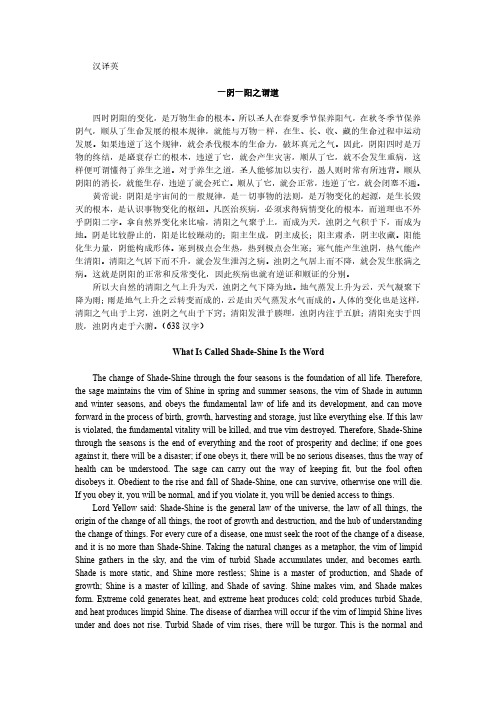
汉译英一阴一阳之谓道四时阴阳的变化,是万物生命的根本。
所以圣人在春夏季节保养阳气,在秋冬季节保养阴气,顺从了生命发展的根本规律,就能与万物一样,在生、长、收、藏的生命过程中运动发展。
如果违逆了这个规律,就会杀伐根本的生命力,破坏真元之气。
因此,阴阳四时是万物的终结,是盛衰存亡的根本,违逆了它,就会产生灾害,顺从了它,就不会发生重病,这样便可谓懂得了养生之道。
对于养生之道,圣人能够加以实行,愚人则时常有所违背。
顺从阴阳的消长,就能生存,违逆了就会死亡。
顺从了它,就会正常,违逆了它,就会闭塞不通。
黄帝说:阴阳是宇宙间的一般规律,是一切事物的法则,是万物变化的起源,是生长毁灭的根本,是认识事物变化的枢纽。
凡医治疾病,必须求得病情变化的根本,而道理也不外乎阴阳二字。
拿自然界变化来比喻,清阳之气聚于上,而成为天,浊阴之气积于下,而成为地。
阴是比较静止的,阳是比较躁动的;阳主生成,阴主成长;阳主肃杀,阴主收藏。
阳能化生力量,阴能构成形体。
寒到极点会生热,热到极点会生寒;寒气能产生浊阴,热气能产生清阳。
清阳之气居下而不升,就会发生泄泻之病。
浊阴之气居上而不降,就会发生胀满之病。
这就是阴阳的正常和反常变化,因此疾病也就有逆证和顺证的分别。
所以大自然的清阳之气上升为天,浊阴之气下降为地。
地气蒸发上升为云,天气凝聚下降为雨;雨是地气上升之云转变而成的,云是由天气蒸发水气而成的。
人体的变化也是这样,清阳之气出于上窍,浊阴之气出于下窍;清阳发泄于腠理,浊阴内注于五脏;清阳充实于四肢,浊阴内走于六腑。
(638汉字)What Is Called Shade-Shine Is the WordThe change of Shade-Shine through the four seasons is the foundation of all life.Therefore, the sage maintains the vim of Shine in spring and summer seasons,the vim of Shade in autumn and winter seasons,and obeys the fundamental law of life and its development,and can move forward in the process of birth,growth,harvesting and storage,just like everything else.If this law is violated,the fundamental vitality will be killed,and true vim destroyed.Therefore,Shade-Shine through the seasons is the end of everything and the root of prosperity and decline;if one goes against it,there will be a disaster;if one obeys it,there will be no serious diseases,thus the way of health can be understood.The sage can carry out the way of keeping fit,but the fool often disobeys it.Obedient to the rise and fall of Shade-Shine,one can survive,otherwise one will die. If you obey it,you will be normal,and if you violate it,you will be denied access to things.Lord Yellow said:Shade-Shine is the general law of the universe,the law of all things,the origin of the change of all things,the root of growth and destruction,and the hub of understanding the change of things.For every cure of a disease,one must seek the root of the change of a disease, and it is no more than Shade-Shine.Taking the natural changes as a metaphor,the vim of limpid Shine gathers in the sky,and the vim of turbid Shade accumulates under,and becomes earth. Shade is more static,and Shine more restless;Shine is a master of production,and Shade of growth;Shine is a master of killing,and Shade of saving.Shine makes vim,and Shade makes form.Extreme cold generates heat,and extreme heat produces cold;cold produces turbid Shade, and heat produces limpid Shine.The disease of diarrhea will occur if the vim of limpid Shine lives under and does not rise.Turbid Shade of vim rises,there will be turgor.This is the normal andabnormal change of Shade-Shine,so the disease can have the distinction of normality and abnormality of a syndrome.So limpid Shine of nature rises to form Heaven,and turbid Shade falls to form earth.The evaporation of earth rises to form clouds,the condensation of air from earth drops to form rain, which is the same case with the change of the human body.The vim of limpid Shine gets out of upper pores and turbid Shade out of lower ones.Likewise,limpid Shine is released from grain of skin,and turbid Shade sinks in the internal organs:heart,liver,spleen,lungs and kidneys;limpid Shine abides in four limbs and turbid Shade runs through six hollows:gallbladder,stomach,large intestine,small intestine,bladder and tri-duct.(475words)。
第十届CASIO杯翻译竞赛西语原文
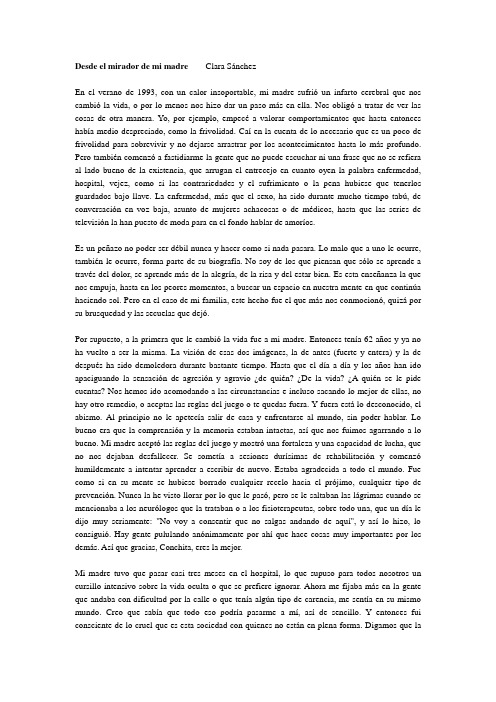
Desde el mirador de mi madre Clara SánchezEn el verano de 1993, con un calor insoportable, mi madre sufrióun infarto cerebral que nos cambió la vida, o por lo menos nos hizo dar un paso más en ella. Nos obligó a tratar de ver las cosas de otra manera. Yo, por ejemplo, empecéa valorar comportamientos que hasta entonces había medio despreciado, como la frivolidad. Caí en la cuenta de lo necesario que es un poco de frivolidad para sobrevivir y no dejarse arrastrar por los acontecimientos hasta lo más profundo. Pero también comenzó a fastidiarme la gente que no puede escuchar ni una frase que no se refiera al lado bueno de la existencia, que arrugan el entrecejo en cuanto oyen la palabra enfermedad, hospital, vejez, como si las contrariedades y el sufrimiento o la pena hubiese que tenerlos guardados bajo llave. La enfermedad, más que el sexo, ha sido durante mucho tiempo tabú, de conversación en voz baja, asunto de mujeres achacosas o de médicos, hasta que las series de televisión la han puesto de moda para en el fondo hablar de amoríos.Es un peñazo no poder ser débil nunca y hacer como si nada pasara. Lo malo que a uno le ocurre, también le ocurre, forma parte de su biografía. No soy de los que piensan que sólo se aprende a través del dolor, se aprende más de la alegría, de la risa y del estar bien. Es esta enseñanza la que nos empuja, hasta en los peores momentos, a buscar un espacio en nuestra mente en que continúa haciendo sol. Pero en el caso de mi familia, este hecho fue el que más nos conmocionó, quizá por su brusquedad y las secuelas que dejó.Por supuesto, a la primera que le cambió la vida fue a mi madre. Entonces tenía 62 años y ya no ha vuelto a ser la misma. La visión de esas dos imágenes, la de antes (fuerte y entera) y la de después ha sido demoledora durante bastante tiempo. Hasta que el día a día y los años han ido apaciguando la sensación de agresión y agravio ¿de quién? ¿De la vida? ¿A quién se le pide cuentas? Nos hemos ido acomodando a las circunstancias e incluso sacando lo mejor de ellas, no hay otro remedio, o aceptas las reglas del juego o te quedas fuera. Y fuera está lo desconocido, el abismo. Al principio no le apetecía salir de casa y enfrentarse al mundo, sin poder hablar. Lo bueno era que la comprensión y la memoria estaban intactas, así que nos fuimos agarrando a lo bueno. Mi madre aceptó las reglas del juego y mostró una fortaleza y una capacidad de lucha, que no nos dejaban desfallecer. Se sometía a sesiones durísimas de rehabilitación y comenzóhumildemente a intentar aprender a escribir de nuevo. Estaba agradecida a todo el mundo. Fue como si en su mente se hubiese borrado cualquier recelo hacia el prójimo, cualquier tipo de prevención. Nunca la he visto llorar por lo que le pasó, pero se le saltaban las lágrimas cuando se mencionaba a los neurólogos que la trataban o a los fisioterapeutas, sobre todo una, que un día le dijo muy seriamente: "No voy a consentir que no salgas andando de aquí", y asílo hizo, lo consiguió. Hay gente pululando anónimamente por ahí que hace cosas muy importantes por los demás. Así que gracias, Conchita, eres la mejor.Mi madre tuvo que pasar casi tres meses en el hospital, lo que supuso para todos nosotros un cursillo intensivo sobre la vida oculta o que se prefiere ignorar. Ahora me fijaba más en la gente que andaba con dificultad por la calle o que tenía algún tipo de carencia, me sentía en su mismo mundo. Creo que sabía que todo eso podría pasarme a mí, asíde sencillo. Y entonces fui consciente de lo cruel que es esta sociedad con quienes no están en plena forma. Digamos que laenfermedad de mi madre nos puso unas gafas de aumento para ver mejor lo que hay alrededor, eso sí, a un gran precio. Tras ella, el mayor sin duda lo ha pagado mi padre, que se ha hecho cargo de esta complicada situación para que a todos nos alterase lo menos posible. No es un hombre pacífico ni resignado, sino más bien rebelde e incisivo, y quizá por eso nunca se ha dejado abatir. Siempre busca recursos para estar activo y en conflicto, y no ha permitido jamás que mi madre dejase de discutir con él y decirle cuatro verdades, aunque fuese a su manera.Lo cierto es que tengo unos padres atípicos y bastante graciosos, muy discutones. Les da la vida montar el pollo durante los telediarios por algo que haya dicho fulano o mengano. Siempre ha habido tensiones políticas entre ellos. Mi padre lee EL PAÍS y Expansión y oye la SER e Intereconomía. Lleva un control férreo de los movimientos de la Bolsa. Cuando baja, está de un humor de perros. Yo, que no tengo inversiones, sé cómo va por el tono de su voz. Le gusta mucho la ropa y los complementos. Y no soporta que le llamen anciano. Lo de abuelo está absolutamente restringido a los nietos. Prefiere la definición de viejo. Dice que se dio cuenta de que era considerado viejo cuando los coches se atrevían a pasar el suyo nada más verle por detrás la nuca blanca. Y no sé cómo se las arregla para hacer un seguimiento tan exhaustivo del mundo literario. Aunque no quiera enterarme, me tiene al tanto de los logros, premios y colaboraciones de todos los colegas, para a continuación añadir, tienes que espabilar. Por eso a mis padres no les importa que escriba sobre ellos, con tal de proporcionarme material y ayudarme a salir adelante.No era fácil durante y tras lo que se podría llamar el largo verano del 93 centrarme en otra cosa. Trataba de distraerme para no hablar ni pensar en ello. Hasta que decidí que no debía olvidar, sino todo lo contrario, aprovecharlo en mi propia experiencia, no desecharlo puesto que tanto esfuerzo nos suponía a todos. Así que tiempo más tarde, cuando ya tenía la cabeza algo más fría, empecé a escribir y salió una novela, Desde el mirador (Alfaguara, 1996), que empieza así:"La tarde va quedando atrás. Un cable negro cruza el cielo azul. La ventanilla de un vagón de tren limita y recorta el campo. Sobre el cable, y por un instante, unos grandes pájaros en fila también quedan atrás. La sierra, a lo lejos, y más cerca los árboles y las fábricas se perfilan en el aire como montañas, árboles y fábricas presentes y reales.He viajado a través de este paisaje durante dos meses y desde entonces el sol se ha ido debilitando poco a poco y también la angustia inicial que me hizo dudar de que la vida fuera buena, a pesar de que es lo único que hay. Ahora me queda cierta flaqueza por aquella duda, cierta zozobra constante y la certeza de que cuando se conoce algo ya no se puede desconocer, no tan sólo olvidar, sino que es imposible volver al origen en que no se sabía aquello.He recorrido los 60 kilómetros que unen el Hospital General con Madrid, cada dos días más o menos, hasta ésta misma tarde en que le han dado el alta a mi madre. La última imagen que he retenido de ella ha sido su blusa de seda azul alejándose en el coche, regresando al mundo, mezclándose con el aire que rodea el hospital y con el que se extiende donde se le pierde de vista y mucho más allá aún. Ya es libre, menos que un pájaro porque no puede volar y menos que un pez porque no puede respirar bajo el agua, pero más que un pájaro y un pez porque piensa. Ella me ha hecho creer que nadie puede ser libre nada más que a su manera.Recuerdo sin desesperación y con pesar, como si me hubiera distraído y no hubiese hecho algo que debía, el día de finales de junio, cuando sonó el teléfono en mi casa, en las afueras de Madrid. Una voz desde un hospital me comunicó que mi madre había sufrido un derrame cerebral. Luego se confirmóque había sido infarto. Me cuesta mucho pronunciar infarto cerebral y mucho más escribirlo, es como tratar de escribir en el papel con un hierro al rojo vivo".。
第十届CASIO杯翻译竞赛英语组原文及获奖译文
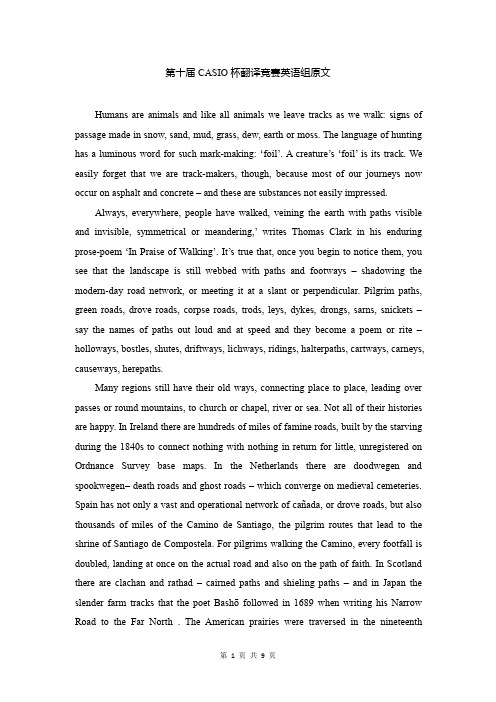
第十届CASIO杯翻译竞赛英语组原文Humans are animals and like all animals we leave tracks as we walk:signs of passage made in snow,sand,mud,grass,dew,earth or moss.The language of hunting has a luminous word for such mark-making:‘foil’.A creature’s‘foil’is its track.We easily forget that we are track-makers,though,because most of our journeys now occur on asphalt and concrete–and these are substances not easily impressed.Always,everywhere,people have walked,veining the earth with paths visible and invisible,symmetrical or meandering,’writes Thomas Clark in his enduring prose-poem‘In Praise of Walking’.It’s true that,once you begin to notice them,you see that the landscape is still webbed with paths and footways–shadowing the modern-day road network,or meeting it at a slant or perpendicular.Pilgrim paths, green roads,drove roads,corpse roads,trods,leys,dykes,drongs,sarns,snickets–say the names of paths out loud and at speed and they become a poem or rite–holloways,bostles,shutes,driftways,lichways,ridings,halterpaths,cartways,carneys, causeways,herepaths.Many regions still have their old ways,connecting place to place,leading over passes or round mountains,to church or chapel,river or sea.Not all of their histories are happy.In Ireland there are hundreds of miles of famine roads,built by the starving during the1840s to connect nothing with nothing in return for little,unregistered on Ordnance Survey base maps.In the Netherlands there are doodwegen and spookwegen–death roads and ghost roads–which converge on medieval cemeteries. Spain has not only a vast and operational network of cañada,or drove roads,but also thousands of miles of the Camino de Santiago,the pilgrim routes that lead to the shrine of Santiago de Compostela.For pilgrims walking the Camino,every footfall is doubled,landing at once on the actual road and also on the path of faith.In Scotland there are clachan and rathad–cairned paths and shieling paths–and in Japan the slender farm tracks that the poet Bashōfollowed in1689when writing his Narrow Road to the Far North.The American prairies were traversed in the nineteenthcentury by broad‘bison roads’,made by herds of buffalo moving several beasts abreast,and then used by early settlers as they pushed westwards across the Great Plains.Paths of long usage exist on water as well as on land.The oceans are seamed with seaways–routes whose course is determined by prevailing winds and currents–and rivers are among the oldest ways of all.During the winter months,the only route in and out of the remote valley of Zanskar in the Indian Himalayas is along the ice-path formed by a frozen river.The river passes down through steep-sided valleys of shaley rock,on whose slopes snow leopards hunt.In its deeper pools,the ice is blue and lucid.The journey down the river is called the chadar,and parties undertaking the chadar are led by experienced walkers known as‘ice-pilots’,who can tell where the dangers lie.Different paths have different characteristics,depending on geology and purpose. Certain coffin paths in Cumbria have flat‘resting stones’on the uphill side,on which the bearers could place their load,shake out tired arms and roll stiff shoulders;certain coffin paths in the west of Ireland have recessed resting stones,in the alcoves of which each mourner would place a pebble.The prehistoric trackways of the English Downs can still be traced because on their close chalky soil,hard-packed by centuries of trampling,daisies flourish.Thousands of work paths crease the moorland of the Isle of Lewis in the Outer Hebrides,so that when seen from the air the moor has the appearance of chamois leather.I think also of the zigzag flexure of mountain paths in the Scottish Highlands,the flagged and bridged packhorse routes of Yorkshire and Mid Wales,and the sunken green-sand paths of Hampshire on whose shady banks ferns emerge in spring,curled like crosiers.The way-marking of old paths is an esoteric lore of its own,involving cairns, grey wethers,sarsens,hoarstones,longstones,milestones,cromlechs and other guide-signs.On boggy areas of Dartmoor,fragments of white china clay were placed to show safe paths at twilight,like Hansel and Gretel’s pebble trail.In mountain country,boulders often indicate fording points over rivers:Utsi’s Stone in the Cairngorms,for instance,which marks where the Allt Mor burn can be crossed toreach traditional grazing grounds,and onto which has been deftly incised the petroglyph of a reindeer that,when evening sunlight plays over the rock,seems to leap to life.Paths and their markers have long worked on me like lures:drawing my sight up and on and over.The eye is enticed by a path,and the mind’s eye also.The imagination cannot help but pursue a line in the land–onwards in space,but also backwards in time to the histories of a route and its previous followers.As I walk paths I often wonder about their origins,the impulses that have led to their creation, the records they yield of customary journeys,and the secrets they keep of adventures, meetings and departures.I would guess I have walked perhaps7,000or8,000miles on footpaths so far in my life:more than most,perhaps,but not nearly so many as others.Thomas De Quincey estimated Wordsworth to have walked a total of 175,000–180,000miles:Wordsworth’s notoriously knobbly legs,‘pointedly condemned’–in De Quincey’s catty phrase–‘by all…female connoisseurs’,were magnificent shanks when it came to passage and bearing.I’ve covered thousands of foot-miles in my memory,because when–as most nights–I find myself insomniac,I send my mind out to re-walk paths I’ve followed,and in this way can sometimes pace myself into sleep.‘They give me joy as I proceed,’wrote John Clare of field paths,simply.Me too.‘My left hand hooks you round the waist,’declared Walt Whitman–companionably, erotically,coercively–in Leaves of Grass(1855),‘my right hand points to landscapes of continents,and a plain public road.’Footpaths are mundane in the best sense of that word:‘worldly’,open to all.As rights of way determined and sustained by use,they constitute a labyrinth of liberty,a slender network of common land that still threads through our aggressively privatized world of barbed wire and gates,CCTV cameras and‘No Trespassing’signs.It is one of the significant differences between land use in Britain and in America that this labyrinth should exist.Americans have long envied the British system of footpaths and the freedoms it offers,as I in turn envy the Scandinavian customary right of Allemansrätten(‘Everyman’s right’).This convention–born of a region that did not pass through centuries of feudalism,andtherefore has no inherited deference to a landowning class–allows a citizen to walk anywhere on uncultivated land provided that he or she cause no harm;to light fires;to sleep anywhere beyond the curtilage of a dwelling;to gather flowers,nuts and berries; and to swim in any watercourse(rights to which the newly enlightened access laws of Scotland increasingly approximate).Paths are the habits of a landscape.They are acts of consensual making.It’s hard to create a footpath on your own.The artist Richard Long did it once,treading a dead-straight line into desert sand by turning and turning about dozens of times.But this was a footmark not a footpath:it led nowhere except to its own end,and by walking it Long became a tiger pacing its cage or a swimmer doing lengths.With no promise of extension,his line was to a path what a snapped twig is to a tree.Paths connect.This is their first duty and their chief reason for being.They relate places in a literal sense,and by extension they relate people.Paths are consensual,too,because without common care and common practice they disappear:overgrown by vegetation,ploughed up or built over(though they may persist in the memorious substance of land law).Like sea channels that require regular dredging to stay open,paths need walking.In nineteenth-century Suffolk small sickles called‘hooks’were hung on stiles and posts at the start of certain wellused paths: those running between villages,for instance,or byways to parish churches.A walker would pick up a hook and use it to lop off branches that were starting to impede passage.The hook would then be left at the other end of the path,for a walker coming in the opposite direction.In this manner the path was collectively maintained for general use.By no means all interesting paths are old paths.In every town and city today, cutting across parks and waste ground,you’ll see unofficial paths created by walkers who have abandoned the pavements and roads to take short cuts and make asides. Town planners call these improvised routes‘desire lines’or‘desire paths’.In Detroit –where areas of the city are overgrown by vegetation,where tens of thousands of homes have been abandoned,and where few can now afford cars–walkers and cyclists have created thousands of such elective easements.第十届CASIO杯翻译竞赛英语组参考译文路[英]罗伯特·麦克法伦作侯凌玮译人是一种动物,因而和所有其他动物一样,我们行走时总会留下踪迹:雪地、沙滩、淤泥、草地、露水、土壤和苔藓上都有我们经过的痕迹。
2023catti杯翻译原文

2023catti杯翻译原文2023 CATTI杯翻译原文愿景和使命:2023 CATTI杯翻译大赛旨在促进翻译行业的发展和提高翻译人才素质。
通过组织这一国际性的翻译大赛,我们希望为各国翻译工作者提供一个交流、学习和展示的平台,激发他们的创作力和翻译技巧,推动翻译事业的繁荣。
大赛安排:本届翻译大赛将分为初赛、决赛和颁奖环节。
初赛将在2023年1月至3月期间进行,参赛者需按照要求完成指定的翻译任务,并提交作品。
经过初赛评审,优秀者将晋级决赛。
决赛将在2023年5月举行,参赛者将现场翻译一段指定的文本,由专业评委进行评审。
最后,将在决赛结束后进行颁奖典礼,表彰各个奖项的获得者。
参赛资格:本次大赛对参赛者的资格要求如下:1.具有中文或其他外语相关专业学历,并且具备一定的翻译实践经验;2.年龄不限,国籍不限;3.需承诺独立完成翻译任务,不得抄袭或借助机器翻译工具。
翻译任务:本次大赛的翻译任务主要包括文学、科技、经济、法律和时事等领域。
详细的翻译要求将在初赛开始前公布,并根据不同的语种设置相应的任务。
评委团队:本届大赛将邀请一流的翻译学者和专业人士组成评委团队,他们将负责对参赛者的作品进行评审和打分。
评委团队将严格按照统一的评分标准进行评判,确保公正、客观地选出最优秀的翻译作品。
奖项设置:本次大赛将设置一、二、三等奖以及优秀奖、人气奖等附加奖项。
每个奖项将评选出数量不等的获奖者,以表彰他们在翻译任务中的出色表现。
此外,大赛还将邀请优秀的获奖者参加一系列研讨会和培训活动,提高他们的专业能力。
宣传推广:为了让更多的翻译工作者了解和参与本届大赛,我们将通过各种渠道进行宣传推广,包括但不限于媒体报道、社交媒体推广、翻译机构合作等。
我们相信,通过广泛的宣传,能够吸引更多优秀的翻译从业者积极参与,使本次大赛更加具有影响力和参与度。
总结:2023 CATTI杯翻译大赛是一项重要的国际翻译赛事,旨在提高翻译人才素质,促进翻译事业的发展。
翻译比赛原文
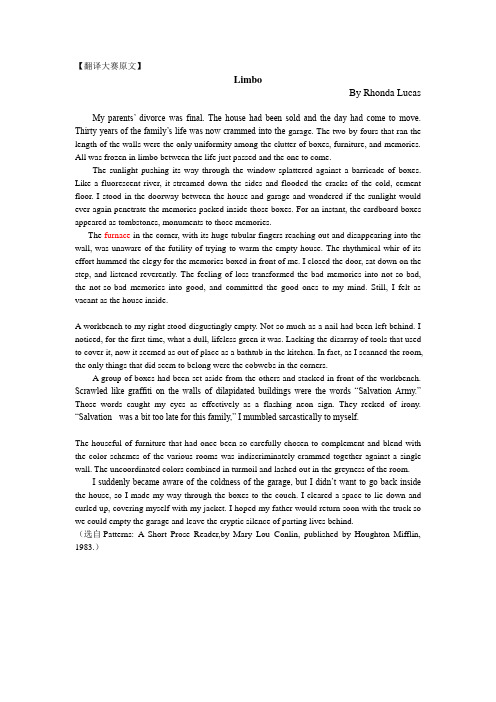
【翻译大赛原文】LimboBy Rhonda LucasMy parents’ divorce was final. The house had been sold and the day had come to move. Thirty years of the family’s life was now crammed into the garage. The two-by-fours that ran the length of the walls were the only uniformity among the clutter of boxes, furniture, and memories. All was frozen in limbo between the life just passed and the one to come.The sunlight pushing its way through the window splattered against a barricade of boxes. Like a fluorescent river, it streamed down the sides and flooded the cracks of the cold, cement floor. I stood in the doorway between the house and garage and wondered if the sunlight would ever again penetrate the memories packed inside those boxes. For an instant, the cardboard boxes appeared as tombstones, monuments to those memories.The furnace in the corner, with its huge tubular fingers reaching out and disappearing into the wall, was unaware of the futility of trying to warm the empty house. The rhythmical whir of its effort hummed the elegy for the memories boxed in front of me. I closed the door, sat down on the step, and listened reverently. The feeling of loss transformed the bad memories into not-so-bad, the not-so-bad memories into good, and committed the good ones to my mind. Still, I felt as vacant as the house inside.A workbench to my right stood disgustingly empty. Not so much as a nail had been left behind. I noticed, for the first time, what a dull, lifeless green it was. Lacking the disarray of tools that used to cover it, now it seemed as out of place as a bathtub in the kitchen. In fact, as I scanned the room, the only things that did seem to belong were the cobwebs in the corners.A group of boxes had been set aside from the others and stacked in front of the workbench. Scrawled like graffiti on the walls of dilapidated buildings were the words “Salvation Army.” Those words caught my eyes as effectively as a flashing neon sign. They reeked of irony. “Salvation - was a bit too late for this family,” I mumbled sarcastically to myself.The houseful of furniture that had once been so carefully chosen to complement and blend with the color schemes of the various rooms was indiscriminately crammed together against a single wall. The uncoordinated colors combined in turmoil and lashed out in the greyness of the room.I suddenly became aware of the coldness of the garage, but I didn’t want to go back inside the house, so I made my way through the boxes to the couch. I cleared a space to lie down and curled up, covering myself with my jacket. I hoped my father would return soon with the truck so we could empty the garage and leave the cryptic silence of parting lives behind.(选自Patterns: A Short Prose Reader,by Mary Lou Conlin, published by Houghton Mifflin, 1983.)。
汉英翻译大赛预赛翻译原文
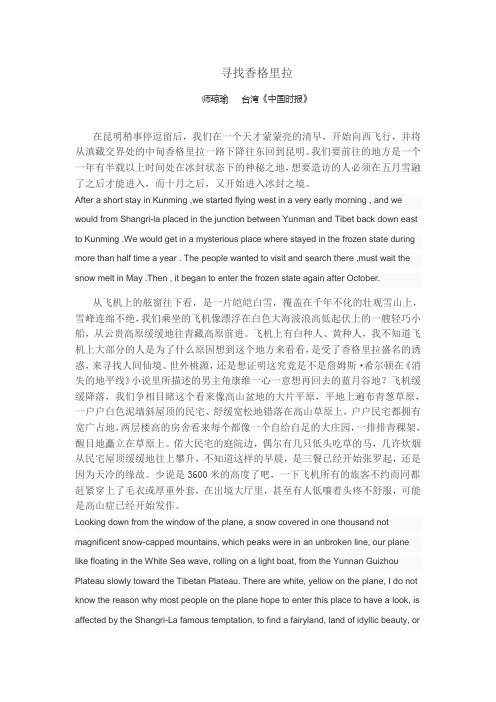
寻找香格里拉师琼瑜台湾《中国时报》在昆明稍事停逗留后,我们在一个天才蒙蒙亮的清早,开始向西飞行,并将从滇藏交界处的中甸香格里拉一路下降往东回到昆明。
我们要前往的地方是一个一年有半载以上时间处在冰封状态下的神秘之地,想要造访的人必须在五月雪融了之后才能进入,而十月之后,又开始进入冰封之境。
After a short stay in Kunming ,we started flying west in a very early morning , and we would from Shangri-la placed in the junction between Yunman and Tibet back down east to Kunming .We would get in a mysterious place where stayed in the frozen state during more than half time a year . The people wanted to visit and search there ,must wait the snow melt in May .Then , it began to enter the frozen state again after October.从飞机上的舷窗往下看,是一片皑皑白雪,覆盖在千年不化的壮观雪山上,雪峰连绵不绝,我们乘坐的飞机像漂浮在白色大海波浪高低起伏上的一艘轻巧小船,从云贵高原缓缓地往青藏高原前进。
飞机上有白种人、黄种人,我不知道飞机上大部分的人是为了什么原因想到这个地方来看看,是受了香格里拉盛名的诱惑,来寻找人间仙境、世外桃源,还是想证明这究竟是不是詹姆斯·希尔顿在《消失的地平线》小说里所描述的男主角康维一心一意想再回去的蓝月谷地?飞机缓缓降落,我们争相目睹这个看来像高山盆地的大片平原,平地上遍布青葱草原,一户户白色泥墙斜屋顶的民宅、舒缓宽松地错落在高山草原上,户户民宅都拥有宽广占地,两层楼高的房舍看来每个都像一个自给自足的大庄园,一排排青稞架,醒目地矗立在草原上。
02翻译竞赛英译中参赛原文
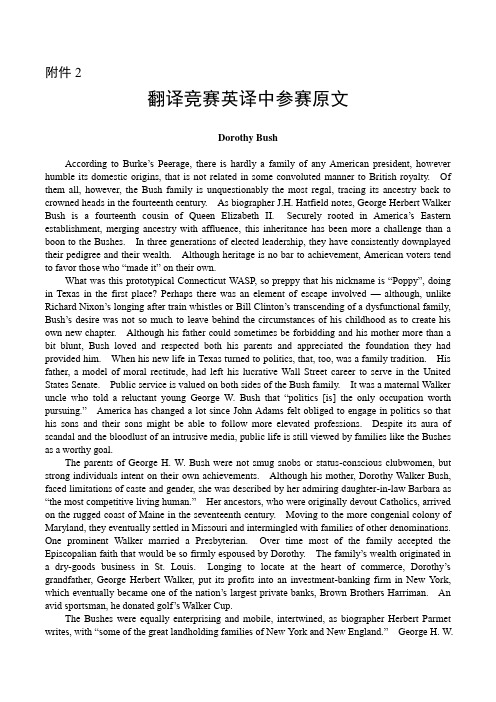
附件2翻译竞赛英译中参赛原文Dorothy BushAccording to Burke’s Peerage, there is hardly a family of any American president, however humble its domestic origins, that is not related in some convoluted manner to British royalty. Of them all, however, the Bush family is unquestionably the most regal, tracing its ancestry back to crowned heads in the fourteenth century. As biographer J.H. Hatfield notes, George Herbert Walker Bush is a fourteenth cousin of Queen Elizabeth II. Securely rooted in America’s Eastern establishment, merging ancestry with affluence, this inheritance has been more a challenge than a boon to the Bushes. In three generations of elected leadership, they have consistently downplayed their pedigree and their wealth. Although heritage is no bar to achievement, American voters tend to favor those who “made it” on their own.What was this prototypical Connecticut WASP, so preppy that his nickname is “Poppy”, doing in Texas in the first place? Perhaps there was an element of escape involved —although, unlike Richard Nixon’s longing after train whistles or Bill Clinton’s transcending of a dysfunctional family, Bush’s desire was not so much to leave behind the circumstances of his childhood as to create his own new chapter. Although his father could sometimes be forbidding and his mother more than a bit blunt, Bush loved and respected both his parents and appreciated the foundation they had provided him. When his new life in Texas turned to politics, that, too, was a family tradition. His father, a model of moral rectitude, had left his lucrative Wall Street career to serve in the United States Senate. Public service is valued on both sides of the Bush family. It was a maternal Walker uncle who told a reluctant young George W. Bush that “politics [is] the only occupation worth pursuing.” America has changed a lot since John Adams felt obliged to engage in politics so that his sons and their sons might be able to follow more elevated professions. Despite its aura of scandal and the bloodlust of an intrusive media, public life is still viewed by families like the Bushes as a worthy goal.The parents of George H. W. Bush were not smug snobs or status-conscious clubwomen, but strong individuals intent on their own achievements. Although his mother, Dorothy Walker Bush, faced limitations of caste and gender, she was described by her admiring daughter-in-law Barbara as “the most competitive living human.” Her ancestors, who were originally devout Catholics, arrived on the rugged coast of Maine in the seventeenth century. Moving to the more congenial colony of Maryland, they eventually settled in Missouri and intermingled with families of other denominations. One prominent Walker married a Presbyterian. Over time most of the family accepted the Episcopal ian faith that would be so firmly espoused by Dorothy. The family’s wealth originated in a dry-goods business in St. Louis. Longing to locate at the heart of commerce, Dorothy’s grandfather, George Herbert Walker, put its profits into an investment-banking firm in New York, which eventually became one of the nation’s largest private banks, Brown Brothers Harriman. An avid sportsman, he donated golf’s Walker Cup.The Bushes were equally enterprising and mobile, intertwined, as biographer Herbert Parmet wr ites, with “some of the great landholding families of New York and New England.” George H. W.Bush’s genial grandfather, Samuel, made his fortune not in Manhattan but as an industrialist in Columbus, Ohio. His son Prescott Bush, born in 1895, was sent east to school, to Phillips Academy in Andover, Massachusetts, and later to Yale, initiating a family tradition. Settling first in Milton, Massachusetts, Prescott made his own fortune as a Wall Street banker. The words used most often to characterize him a re “imposing,” “stern,” and “commanding.” He grew to six feet, four inches, with a full head of black hair. Parmet describes him as “austere, regal, dignified, and imperious” —a classic authority figure. He loved children, however, and would have five, although most of the day-to-day childrearing was always in the hands of his wife, Dorothy, whom he would marry in 1921 at the Church of Saint Ann in Kennebunkport, Maine.Had she been born a generation or two later, Dorothy Walker might have had a dazzling career of her own. She was the fire to her husband’s ice —outgoing, amusing, outspoken, and adventuresome, yet very much a lady. A proper marriage for her was the preoccupation of Dorothy’s protective parents, who still lived in St. Louis. After atte nding private schools, she was sent east for “finishing” at Miss Porter’s School in Farmington, Connecticut, in preparation for her presentation to society. Called “Dottie,” she particularly excelled in athletics. In 1918 she was runner-up in the girls’ national tennis tournament. She was so gifted an athlete that even at the age of thirty-nine, a mother of five, she took a set from a lady who had lost in the national tennis finals to the legendary Alice Marble.They were a handsome couple, Dorothy and Prescott Bush, although she was the more cheerful and sociable. Their first son, named for his father, was born after the frantic hospital ride in 1922. Two years later, their second son was horn, and named George Herbert Walker Bush, representing both f amilies. His grandfather Walker called him “Little Pop,” which became “Poppy.” There would be two more boys, and a welcome girl, Nancy. As Prescott’s investment house prospered, merged, and moved to Manhattan, the family relocated to a larger, comfortably unostentatious home in Greenwich, Connecticut.选自:Faith of Our Mothers 作者:Harold Gullan。
历届韩素音翻译大奖赛竞赛原文及译文
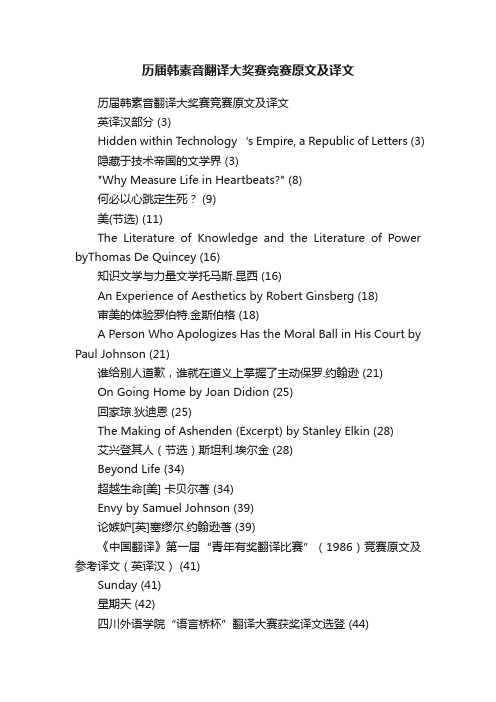
历届韩素音翻译大奖赛竞赛原文及译文历届韩素音翻译大奖赛竞赛原文及译文英译汉部分 (3)Hidden within Technology‘s Empire, a Republic of Letters (3)隐藏于技术帝国的文学界 (3)"Why Measure Life in Heartbeats?" (8)何必以心跳定生死? (9)美(节选) (11)The Literature of Knowledge and the Literature of Power byThomas De Quincey (16)知识文学与力量文学托马斯.昆西 (16)An Experience of Aesthetics by Robert Ginsberg (18)审美的体验罗伯特.金斯伯格 (18)A Person Who Apologizes Has the Moral Ball in His Court by Paul Johnson (21)谁给别人道歉,谁就在道义上掌握了主动保罗.约翰逊 (21)On Going Home by Joan Didion (25)回家琼.狄迪恩 (25)The Making of Ashenden (Excerpt) by Stanley Elkin (28)艾兴登其人(节选)斯坦利.埃尔金 (28)Beyond Life (34)超越生命[美] 卡贝尔著 (34)Envy by Samuel Johnson (39)论嫉妒[英]塞缪尔.约翰逊著 (39)《中国翻译》第一届“青年有奖翻译比赛”(1986)竞赛原文及参考译文(英译汉) (41)Sunday (41)星期天 (42)四川外语学院“语言桥杯”翻译大赛获奖译文选登 (44)第七届“语言桥杯”翻译大赛获奖译文选登 (44)The Woods: A Meditation (Excerpt) (46)林间心语(节选) (47)第六届“语言桥杯”翻译大赛获奖译文选登 (50)第五届“语言桥杯”翻译大赛原文及获奖译文选登 (52)第四届“语言桥杯”翻译大赛原文、参考译文及获奖译文选登 (54) When the Sun Stood Still (54)永恒夏日 (55)CASIO杯翻译竞赛原文及参考译文 (56)第三届竞赛原文及参考译文 (56)Here Is New York (excerpt) (56)这儿是纽约 (58)第四届翻译竞赛原文及参考译文 (61)Reservoir Frogs (Or Places Called Mama's) (61)水库青蛙(又题:妈妈餐馆) (62)中译英部分 (66)蜗居在巷陌的寻常幸福 (66)Simple Happiness of Dwelling in the Back Streets (66)在义与利之外 (69)Beyond Righteousness and Interests (69)读书苦乐杨绛 (72)The Bitter-Sweetness of Reading Yang Jiang (72)想起清华种种王佐良 (74)Reminiscences of Tsinghua Wang Zuoliang (74)歌德之人生启示宗白华 (76)What Goethe's Life Reveals by Zong Baihua (76)怀想那片青草地赵红波 (79)Yearning for That Piece of Green Meadow by Zhao Hongbo (79)可爱的南京 (82)Nanjing the Beloved City (82)霞冰心 (84)The Rosy Cloud byBingxin (84)黎明前的北平 (85)Predawn Peiping (85)老来乐金克木 (86)Delights in Growing Old by Jin Kemu (86)可贵的“他人意识” (89)Calling for an Awareness of Others (89)教孩子相信 (92)To Implant In Our Children‘s Young Hearts An Undying Faith In Humanity (92)心中有爱 (94)Love in Heart (94)英译汉部分Hidden within Technology’s Empire, a Republic of Le tters 隐藏于技术帝国的文学界索尔·贝娄(1)When I was a boy ―discovering literature‖, I used to think how wonderful it would be if every other person on the street were familiar with Proust and Joyce or T. E. Lawrence or Pasternak and Kafka. Later I learned how refractory to high culture the democratic masses were. Lincoln as a young frontiersman read Plutarch, Shakespeare and the Bible. But then he was Lincoln.我还是个“探索文学”的少年时,就经常在想:要是大街上人人都熟悉普鲁斯特和乔伊斯,熟悉T.E.劳伦斯,熟悉帕斯捷尔纳克和卡夫卡,该有多好啊!后来才知道,平民百姓对高雅文化有多排斥。
第十届翻译竞赛原文文档
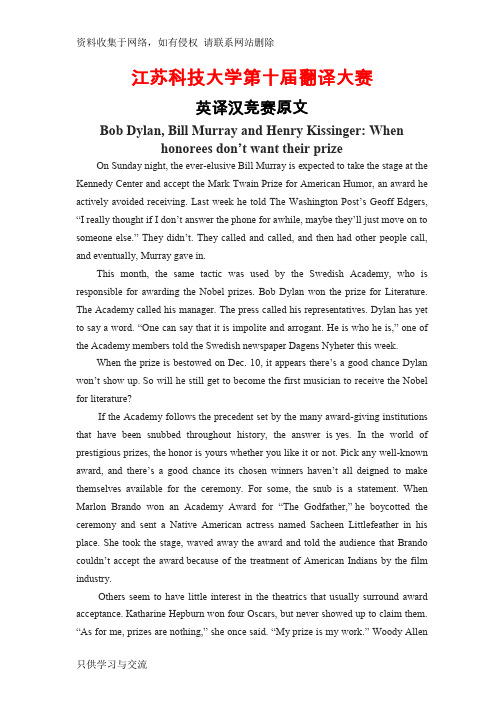
江苏科技大学第十届翻译大赛英译汉竞赛原文Bob Dylan, Bill Murray and Henry Kissinger: Whenhonorees don’t want their prizeOn Sunday night, the ever-elusive Bill Murray is expected to take the stage at the Kennedy Center and accept the Mark Twain Prize for American Humor, an award he actively avoided receiving. Last week he told The Washington Post’s Geoff Edgers, “I really thought if I don’t answer the phone for awhile, maybe they’ll just move on to someone else.”They didn’t. They called and called, and then had other people call, and eventually, Murray gave in.This month, the same tactic was used by the Swedish Academy, who is responsible for awarding the Nobel prizes. Bob Dylan won the prize for Literature. The Academy called his manager. The press called his representatives. Dylan has yet to say a word. “One can say that it is impolite and arrogant. He is who he is,” one of the Academy members told the Swedish newspaper Dagens Nyheter this week.When the prize is bestowed on Dec. 10, it appears there’s a good chance Dylan won’t show up. So will he still get to become the first musician to receive the Nobel for literature?If the Academy follows the precedent set by the many award-giving institutions that have been snubbed throughout history, the answer is yes. In the world of prestigious prizes, the honor is yours whether you like it or not. Pick any well-known award, and there’s a good chance its chosen winners haven’t all deigned to make themselves available for the ceremony. For some, the snub is a statement. When Marlon Brando won an Academy Award for “The Godfather,” he boycotted the ceremony and sent a Native American actress named Sacheen Littlefeather in his place. She took the stage, waved away the award and told the audience that Brando couldn’t accept the award because of the treatment of American Indians by the film industry.Others seem to have little interest in the theatrics that usually surround award acceptance. Katharine Hepburn won four Oscars, but never showed up to claim them. “As for me, prizes are nothing,” she once said. “My prize is my work.” Woody Allenwon’t show up to the Oscars, either. His biographer Eric Lax told NPR that’s b ecause Allen, like his character in “Annie Hall,” quotes Sigmund Freud: “I would never want to belong to any club that would have someone like me for a member.”Some famous snubbers give no reasoning. Maggie Smith has been nominated for nine Emmys, and has won four times. She’s never showed up. When this year’s Emmy host Jimmy Kimmel announced another Smith win this year, he said, “Maggie, if you want this, it will be in the lost and found.” The 81-year-old Smith responded via a PBS Twitter account: “If Mr.Kimmel could please direct me to the lost and found office I will try and be on the next flight.”The world of Nobel prizes is far less star-studded than that of entertainment awards, but it’s hardly free of cold shoulders. The most notable came in 1973, when the Peace Prize was awarded to Vietnamese politician Le Duc Tho and then-U.S. Secretary of State Henry Kissinger, who negotiated a cease-fire agreement meant to bring about an end to the Vietnam War. But the conflict was two years away from ending. Awarding Tho and Kissinger the prize was so controversial, two members of the Nobel selection committee resigned in protest. Vietnam’s Tho refused it outright. Kissinger didn’t show at the ceremony, and tried to return the medal.But not once in the Nobe l committee’s 115-year history has it allowed a prize to be revoked or returned. Once it’s awarded, it’s awarded for life. In the case of Dylan, this history hasn’t stopped naysayers from calling for a do-over. While Dylan has showed up to accept awards in the past —including the Presidential Medal of Freedom — now, he seems to have no interest. Why give a prize to someone who doesn’t want it?His fans see his indifference as a charming characteristic of his mysterious persona. His critics hold it up as just another reason why a man so prominent shouldn’t have been chosen in the first place.“Bob Dylan now has a chance to do something truly great for literature: reject the Nobel Prize for Literature,” poet Amy King exp ressed to PEN America, a writers association. “He can take a stand and declare that fame and ease of consumption should not play a role in determining merit when it comes to focusing the public eye on one writer’s books.” Dylan certainly could try to reject the prize. But first, he’d have to acknowledge that he won it. (779字)汉译英竞赛原文请你把脚步放轻些一个人要赢得人们的尊敬,绝不是靠权威、靠装潢、靠强迫就能得到的。
翻译大赛
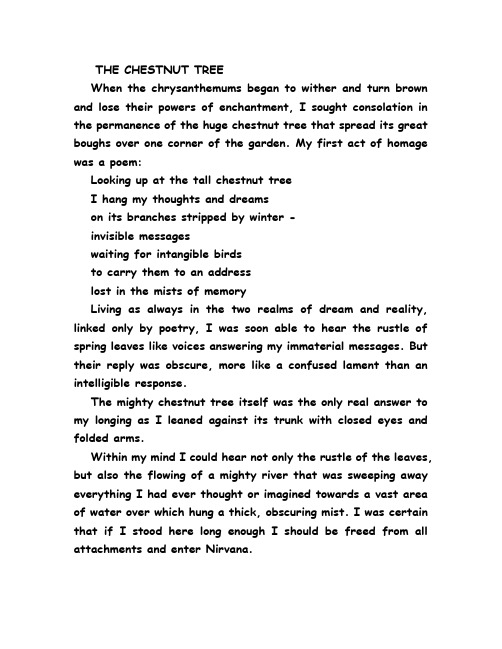
THE CHESTNUT TREEWhen the chrysanthemums began to wither and turn brown and lose their powers of enchantment, I sought consolation in the permanence of the huge chestnut tree that spread its great boughs over one corner of the garden. My first act of homage was a poem:Looking up at the tall chestnut treeI hang my thoughts and dreamson its branches stripped by winter -invisible messageswaiting for intangible birdsto carry them to an addresslost in the mists of memoryLiving as always in the two realms of dream and reality, linked only by poetry, I was soon able to hear the rustle of spring leaves like voices answering my immaterial messages. But their reply was obscure, more like a confused lament than an intelligible response.The mighty chestnut tree itself was the only real answer to my longing as I leaned against its trunk with closed eyes and folded arms.Within my mind I could hear not only the rustle of the leaves, but also the flowing of a mighty river that was sweeping away everything I had ever thought or imagined towards a vast area of water over which hung a thick, obscuring mist. I was certain that if I stood here long enough I should be freed from all attachments and enter Nirvana.The chestnut tree is an avatar of Yggdrasil, the World Tree. Like Yggdrasil it holds the sky in its branches and the underworld in its roots. Contact with it puts me in touch with all the forces of the cosmos that flow through me like electricity through a conductor, so that I become an atom in the vast organism of the universe.---from Michael Bullock, “The Walled Garden”板栗树当菊花开始凋落成棕褐,失去了权力的魅力,我寻求安慰巨大的板栗树,其巨大的树枝铺在花园的一个角落里以上的持久性。
翻译大赛原文一
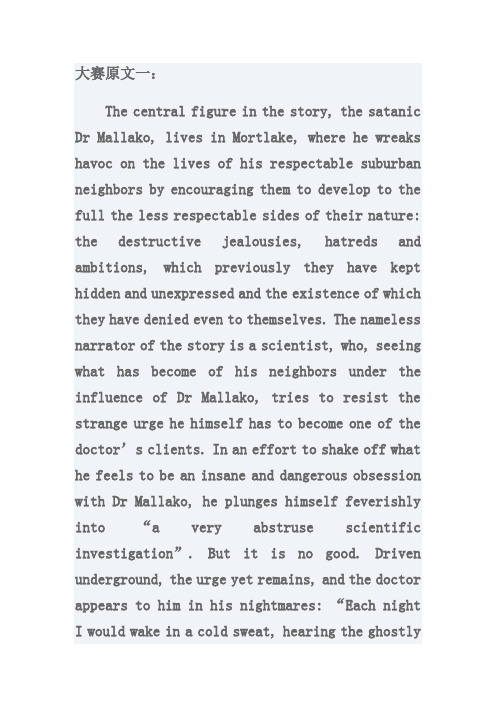
大赛原文一:The central figure in the story, the satanic Dr Mallako, lives in Mortlake, where he wreaks havoc on the lives of his respectable suburban neighbors by encouraging them to develop to the full the less respectable sides of their nature: the destructive jealousies, hatreds and ambitions, which previously they have kept hidden and unexpressed and the existence of which they have denied even to themselves. The nameless narrator of the story is a scientist, who, seeing what has become of his neighbors under the influence of Dr Mallako, tries to resist the strange urge he himself has to become one of the doctor’s clients. In an effort to shake off what he feels to be an insane and dangerous obsession with Dr Mallako, he plunges himself feverishly into “a very abstruse scientific investigation”. But it is no good. Driven underground, the urge yet remains, and the doctor appears to him in his nightmares: “Each night I would wake in a cold sweat, hearing the ghostlyvoice saying ‘COME!’”From talking to his neighbors, the narrator realizes that the doctor’s power lies in his ability to read “secret thoughts” and to bring them out into the open, “like monsters of the deep emerging from their dark caves to bring horror to the crews of whalers”. The realization is a challenge to his hitherto optimistic view of human nature, and he begins to despair at the thought that all people, even the most conventional and respectable, have a dark side; that each and every one of them has some nasty secret about themselves that they keep hidden. Reflecting on this, he becomes “increasingly filled with a general detestation of mankind”. Dr Mallako, he realizes, is not a uniquely evil person, but simply the catalyst for the evil that lies within all of us:…in his malignant min d, in his cold destructive intellect, are concentrated in quintessential form all the baseness, all the cruelty, all the helpless rage of feeble menaspiring to be Titans…in many who are timidly respectable there lurks the hope of splendid sin, the wish to dominate and the urge to destroy.Eventually, the narrator becomes completely possessed with the desire to punish the sinful, that is, the entire human race. He thus invents and builds a device designed to boil all the water on the earth, contemplating with satisfaction as he does so the vision of the world getting hotter and drier and the unbearable thirst of mankind growing until, at last, “in a universal shriek of madness, they will perish”. After that, he reasons, “there will be no more Sin”, the planet will become dead like the moon, “and it will then be as beautiful and as innocent”.大赛原文二:When he was a child, Russell writes in his Autobiography, he was “unusually prone to a sense of sin”. When he was asked to name his favorite hymn, he chose “weary of earth andladen with my sin”. A natural consequence of his secrecy was a troubled conscience, the feeling that his secrets were perpetually liable to be discovered. When, one morning during the family’s daily prayer meeting, Lady Russell read the parable of the Prodigal Son, Bertie said to her: “I know why you did that – because I broke my jug.” When she later repeated the story with great amusement, he felt still more humiliated (“Most of my vivid early memories are of humiliations”). She did no t realize, he wrote, “that she was responsible for a morbidness which had produced tragic results in her own children.”When Bertie was seven, some relief from the oppressive atmosphere of Pembroke Lodge came when the Russells took a house in London for a few months and Bertie and Frank began for the first time to see something of their other grandmother, Lady Stanley of Alderley, and her remarkable family. Lady Stanley was an aristocrat of a quite different stamp from LadyRussell. A few years older than Lady Russell, she had grown up in the atmosphere of robust rationalism that had prevailed in Britain before the succession of Victoria, and, Russell recalls, was “contemptuous of Victorian goody-goody priggery”.As might be expected, she took a great liking to Frank and a corresponding dislike to Bertie, whom she dismissed as “just like his father”. She had a large family of four sons and four daughters, most of them talented, all of them argumentative, and none of them shy. They terrified Bertie and enchanted Frank. Of the sons, Henry was a Muslim, Lyulph an atheist and Algernon a Roman Catholic priest. On Sunday they would all gather for lunch and engage each other in vigorous and unrestrained debate, each contradicting the other and shouting at the top o f their voices. “I used to go to those luncheons in fear and trembling,” Bertie remembered, “since I never knew but what the whole pack would turn on me.” Frank, on the other hand, feltperfectly at home: “It was full of instruction, entertainment and plea sure… I heard matters freely discussed; I was allowed to speak for myself… I loved it.”Frank came to love the Stanleys as warmly as he hated the Russells, and Lady Stanley’s house at 40 Dove Street became for him a second home, a welcome break from Pembroke Lodge. Bertie remained – to all outward appearances at least – a loyal and devoted Russell. When he looked back on the two families in his old age, however, he found that his sympathies had changed: “I owe to the Russells shyness, sensitiveness, and metaphysics; to the Stanleys vigour, good health, and good spirits. On the whole, the latter seems a better inheritance than the former.”。
第十届全国英语辩论赛张京的稿子
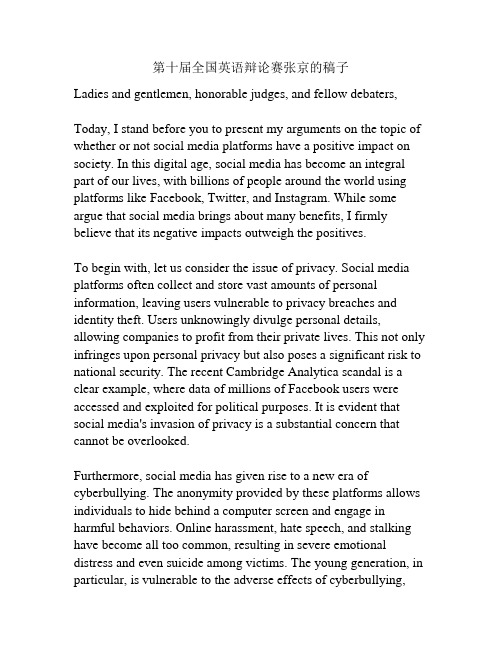
第十届全国英语辩论赛张京的稿子Ladies and gentlemen, honorable judges, and fellow debaters,Today, I stand before you to present my arguments on the topic of whether or not social media platforms have a positive impact on society. In this digital age, social media has become an integral part of our lives, with billions of people around the world using platforms like Facebook, Twitter, and Instagram. While some argue that social media brings about many benefits, I firmly believe that its negative impacts outweigh the positives.To begin with, let us consider the issue of privacy. Social media platforms often collect and store vast amounts of personal information, leaving users vulnerable to privacy breaches and identity theft. Users unknowingly divulge personal details, allowing companies to profit from their private lives. This not only infringes upon personal privacy but also poses a significant risk to national security. The recent Cambridge Analytica scandal is a clear example, where data of millions of Facebook users were accessed and exploited for political purposes. It is evident that social media's invasion of privacy is a substantial concern that cannot be overlooked.Furthermore, social media has given rise to a new era of cyberbullying. The anonymity provided by these platforms allows individuals to hide behind a computer screen and engage in harmful behaviors. Online harassment, hate speech, and stalking have become all too common, resulting in severe emotional distress and even suicide among victims. The young generation, in particular, is vulnerable to the adverse effects of cyberbullying,leading to poor mental health and social isolation. Clearly, the negative impacts of social media on individuals' well-being cannot be ignored.Moreover, social media has also contributed to the spread of false information and the erosion of trust in traditional media. The riseof "fake news" and the ease with which it can be shared on these platforms has led to the manipulation of public opinion and division within societies. Political actors can easily exploit social media to disseminate misinformation, influencing elections and undermining democratic processes. This erosion of trust in reliable sources of information is detrimental to the functioning of a democratic society and threatens the stability of our communities.Lastly, let us not forget the detrimental impact of excessive social media usage on our physical health. Spending hours scrolling through endless feeds and sitting in sedentary positions not only leads to a sedentary lifestyle but also increases the risk of obesity, heart disease, and other chronic conditions. In addition, the constant exposure to unrealistic beauty standards and lifestyle portrayals can negatively impact individuals' body image and self-esteem, leading to a rise in mental health disorders.In conclusion, while social media platforms may provide benefits such as enhancing connectivity and facilitating information sharing, the negative impacts on privacy, cyberbullying, misinformation, and physical health should not be overlooked. As responsible individuals, it is crucial to recognize and address these issues to ensure a safer and healthier society for all. Thank you.。
翻译大赛原文

A Garden That Welcomes StrangersBy Allen LacyI do not know what became of her, and I never learned her name. But I feel that I knew her from the garden she had so lovingly made over many decades.The house she lived in lies two miles from mine –a simple, two-story structure with the boxy plan, steeply-pitched roof and unadorned lines that are typical of houses built in the middle of the nineteenth century near the New Jersey shore.Her garden was equally simple. She was not a conventional gardener who did everything by the book, following the common advice to vary her plantings so there would be something in bloom from the first crocus in the spring to the last chrysanthemum in the fall. She had no respect for the rule that says thattall-growing plants belong at the rear of a perennial border, low ones in the front and middle-sized ones in the middle, with occasional exceptions for dramatic accent.In her garden, everything was accent, everything was tall, and the evidence was plain that she loved three kinds of plant and three only: roses, clematisand lilies, intermingled promiscuously to pleasant effect but no apparent design.She grew a dozen sorts of clematis, perhaps 50 plants in all, trained and tied so that they clambered up metal rods, each rod crowned intermittently throughout the summer by a rounded profusion of large blossoms of dark purple, rich crimson, pale lavender, light blue and gleaming white.Her taste in roses was old-fashioned. There wasn’t a single modern hybrid tea rose or floribunda in sight. Instead, she favored the roses of other ages –the York and Lancaster rose, the cabbage rose, the damask and the rugosa rose in several varieties. She propagated her roses herself from cuttings stuck directly in the ground and protected by upended gallon jugs.Lilies, I believe were her greatest love. Except for some Madonna lilies it is impossible to name them, since the wooden flats stood casually here and there in the flower bed, all thickly planted with dark green lily seedlings. The occasional paper tag fluttering from a seed pod with the date and record of a cross showed that she was an amateur hybridizer with some special fondness for lilies of a warm muskmelon shade or a pale lemon yellow.She believed in sharing her garden. By her curb there was a sign: “This is my garden, and you are welcome here. Take whatever you wish with your eyes, but nothing with your hand.”Until five years ago, her garden was always immaculately tended, the lawn kept fertilized and mowed, the flower bed free of weeds, the tall lilies carefully staked. But then something happened. I don’t know what it was, but the lawn was mowed less frequently, then not at all. Tall grass invaded the roses, the clematis, the lilies. The elm tree in her front yard sickened and died, and when a coastal gale struck, the branches that fell were never removed.With every year, the neglect has grown worse. Wild honeysuckle and bittersweet run rampant in the garden. Sumac, ailanthus, poison ivy and other uninvited things threaten the few lilies and clematis and roses that still struggle for survival.Last year the house itself went dead. The front door was padlocked and the windows covered with sheets of plywood. For many months there has been a for sale sign out front, replacing the sign inviting strangers to share her garden.I drive by that house almost daily and have been tempted to load a shovel in my car trunk, stop at her curb and rescue a few lilies from the smotheringthicket of weeds. The laws of trespass and the fact that her house sits across the street from a police station have given me the cowardice to resist temptation. But her garden has reminded me of mortality; gardeners and the gardens they make are fragile things, creatures of time, hostages to chance and to decay.Last week, the for sale sign out front came down and the windows were unboarded. A crew of painters arrived and someone cut down the dead elm tree. This morning there was a moving van in the driveway unloading a swing set, a barbecue grill, a grand piano and a houseful of sensible furniture. A young family is moving into that house.I hope that among their number is a gardener whose special fondness for old roses and clematis and lilies will see to it that all else is put aside until that flower bed is restored to something of its former self.(选自Patterns: A Short Prose Reader, by Mary Lou Conlin, published by Houghton Mifflin Company, 1983.)。
海伦斯诺翻译比赛原文
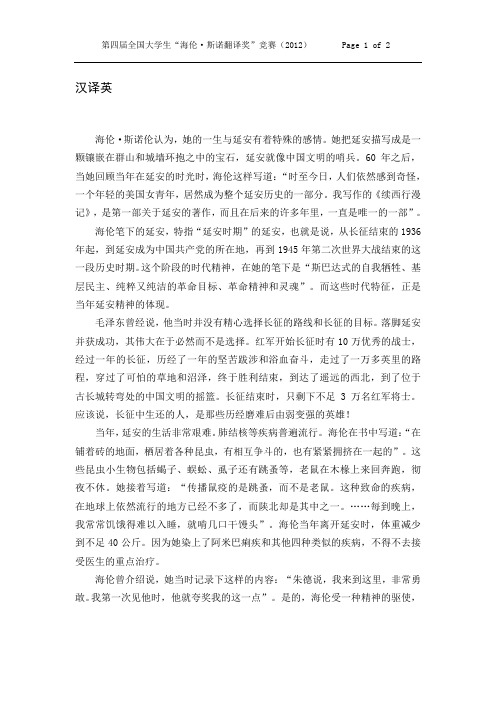
汉译英海伦·斯诺伦认为,她的一生与延安有着特殊的感情。
她把延安描写成是一颗镶嵌在群山和城墙环抱之中的宝石,延安就像中国文明的哨兵。
60年之后,当她回顾当年在延安的时光时,海伦这样写道:“时至今日,人们依然感到奇怪,一个年轻的美国女青年,居然成为整个延安历史的一部分。
我写作的《续西行漫记》,是第一部关于延安的著作,而且在后来的许多年里,一直是唯一的一部”。
海伦笔下的延安,特指“延安时期”的延安,也就是说,从长征结束的1936年起,到延安成为中国共产党的所在地,再到1945年第二次世界大战结束的这一段历史时期。
这个阶段的时代精神,在她的笔下是“斯巴达式的自我牺牲、基层民主、纯粹又纯洁的革命目标、革命精神和灵魂”。
而这些时代特征,正是当年延安精神的体现。
毛泽东曾经说,他当时并没有精心选择长征的路线和长征的目标。
落脚延安并获成功,其伟大在于必然而不是选择。
红军开始长征时有10万优秀的战士,经过一年的长征,历经了一年的坚苦跋涉和浴血奋斗,走过了一万多英里的路程,穿过了可怕的草地和沼泽,终于胜利结束,到达了遥远的西北,到了位于古长城转弯处的中国文明的摇篮。
长征结束时,只剩下不足3万名红军将士。
应该说,长征中生还的人,是那些历经磨难后由弱变强的英雄!当年,延安的生活非常艰难。
肺结核等疾病普遍流行。
海伦在书中写道:“在铺着砖的地面,栖居着各种昆虫,有相互争斗的,也有紧紧拥挤在一起的”。
这些昆虫小生物包括蝎子、蜈蚣、虱子还有跳蚤等,老鼠在木椽上来回奔跑,彻夜不休。
她接着写道:“传播鼠疫的是跳蚤,而不是老鼠。
这种致命的疾病,在地球上依然流行的地方已经不多了,而陕北却是其中之一。
……每到晚上,我常常饥饿得难以入睡,就啃几口干馒头”。
海伦当年离开延安时,体重减少到不足40公斤。
因为她染上了阿米巴痢疾和其他四种类似的疾病,不得不去接受医生的重点治疗。
海伦曾介绍说,她当时记录下这样的内容:“朱德说,我来到这里,非常勇敢。
历届韩素音翻译大奖赛竞赛原文及译文详解
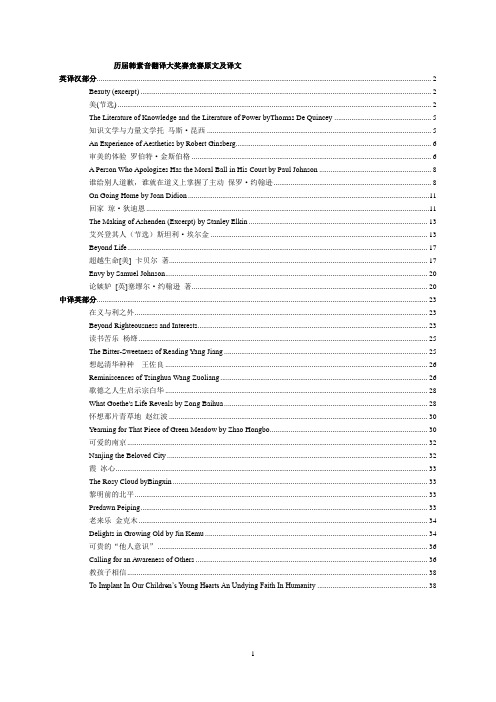
历届韩素音翻译大奖赛竞赛原文及译文英译汉部分 (2)Beauty (excerpt) (2)美(节选) (2)The Literature of Knowledge and the Literature of Power byThomas De Quincey (5)知识文学与力量文学托马斯.昆西 (5)An Experience of Aesthetics by Robert Ginsberg (6)审美的体验罗伯特.金斯伯格 (6)A Person Who Apologizes Has the Moral Ball in His Court by Paul Johnson (8)谁给别人道歉,谁就在道义上掌握了主动保罗.约翰逊 (8)On Going Home by Joan Didion (11)回家琼.狄迪恩 (11)The Making of Ashenden (Excerpt) by Stanley Elkin (13)艾兴登其人(节选)斯坦利.埃尔金 (13)Beyond Life (17)超越生命[美] 卡贝尔著 (17)Envy by Samuel Johnson (20)论嫉妒[英]塞缪尔.约翰逊著 (20)中译英部分 (23)在义与利之外 (23)Beyond Righteousness and Interests (23)读书苦乐杨绛 (25)The Bitter-Sweetness of Reading Yang Jiang (25)想起清华种种王佐良 (26)Reminiscences of Tsinghua Wang Zuoliang (26)歌德之人生启示宗白华 (28)What Goethe's Life Reveals by Zong Baihua (28)怀想那片青草地赵红波 (30)Yearning for That Piece of Green Meadow by Zhao Hongbo (30)可爱的南京 (32)Nanjing the Beloved City (32)霞冰心 (33)The Rosy Cloud byBingxin (33)黎明前的北平 (33)Predawn Peiping (33)老来乐金克木 (34)Delights in Growing Old by Jin Kemu (34)可贵的“他人意识” (36)Calling for an Awareness of Others (36)教孩子相信 (38)To Implant In Our Children’s Young Hearts An Undying Faith In Humanity (38)英译汉部分Beauty (excerpt)美(节选)Judging from the scientists I know, including Eva and Ruth, and those whom I've read about, you can't pursue the laws of nature very long without bumping撞倒; 冲撞into beauty. “I don't know if it's the same beauty you see in the sunset,”a friend tells me, “but it feels the same.”This friend is a physicist, who has spent a long career deciphering破译(密码), 辨认(潦草字迹) what must be happening in the interior of stars. He recalls for me this thrill on grasping for the first time Dirac's⑴equations describing quantum mechanics, or those o f Einstein describing relativity. “They're so beautiful,” he says, “you can see immediately they have to be true. Or at least on the way toward truth.” I ask him what makes a theory beautiful, and he replies, “Simplicity, symmetry .对称(性); 匀称, 整齐, elegance, and power.”我结识一些科学家(包括伊娃和露丝),也拜读过不少科学家的著作,从中我作出推断:人们在探求自然规律的旅途中,须臾便会与美不期而遇。
届翻译大赛英译汉范文及中文译文
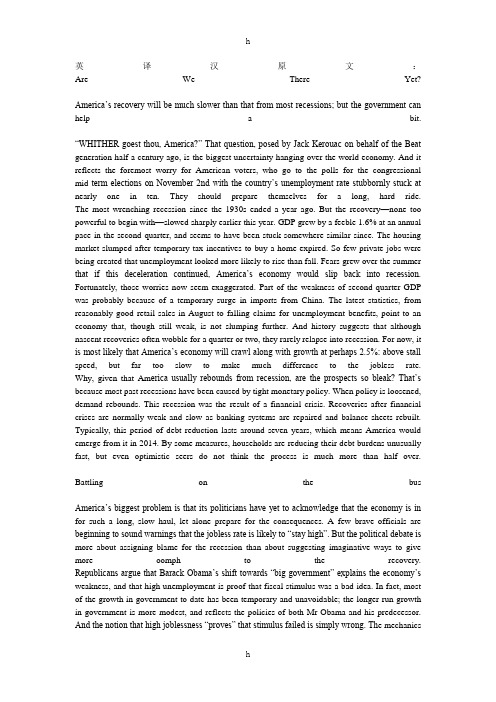
英译汉原文:Are We There Yet?America’s recovery will be much slower than that from most recessions; but the government can help a bit.“WHITHER goest thou, America?” That question, posed by Jack Kerouac on behalf of the Beat generation half a century ago, is the biggest uncertainty hanging over the world economy. And it reflects the foremost worry for American voters, who go to the polls for the congressional mid-term elections on November 2nd with the country’s unemployment rate stubbornly stuck at nearly one in ten. They should prepare themselves for a long, hard ride. The most wrenching recession since the 1930s ended a year ago. But the recovery—none too powerful to begin with—slowed sharply earlier this year. GDP grew by a feeble 1.6% at an annual pace in the second quarter, and seems to have been stuck somewhere similar since. The housing market slumped after temporary tax incentives to buy a home expired. So few private jobs were being created that unemployment looked more likely to rise than fall. Fears grew over the summer that if this deceleration continued, America’s economy would slip back into recession. Fortunately, those worries now seem exaggerated. Part of the weakness of second-quarter GDP was probably because of a temporary surge in imports from China. The latest statistics, from reasonably good retail sales in August to falling claims for unemployment benefits, point to an economy that, though still weak, is not slumping further. And history suggests that although nascent recoveries often wobble for a quarter or two, they rarely relapse into recession. For now, it is most likely that America’s economy will crawl along with growth at perhaps 2.5%: above stall speed, but far too slow to make much difference to the jobless rate. Why, given that Am erica usually rebounds from recession, are the prospects so bleak? That’s because most past recessions have been caused by tight monetary policy. When policy is loosened, demand rebounds. This recession was the result of a financial crisis. Recoveries after financial crises are normally weak and slow as banking systems are repaired and balance-sheets rebuilt. Typically, this period of debt reduction lasts around seven years, which means America would emerge from it in 2014. By some measures, households are reducing their debt burdens unusually fast, but even optimistic seers do not think the process is much more than half over.Battling on the busAmerica’s biggest problem is that its politicians have yet to acknowledge that the economy is in for such a long, slow haul, let alone prepare for the consequences. A few brave officials are beginning to sound warnings that the jobless rate is likely to “stay high”. But the political debate is more about assigning blame for the recession than about suggesting imaginative ways to give more oomph to the recovery. Republicans argue that Barack Obama’s shift towards “big government” explains the economy’s weakness, and that high unemployment is proof that fiscal stimulus was a bad idea. In fact, most of the growth in government to date has been temporary and unavoidable; the longer-run growth in government is more modest, and reflects the policies of both Mr Obama and his predecessor. And the notion that high joblessness “proves” that stimulus failed is simply wrong. Th e mechanicsof a financial bust suggest that without a fiscal boost the recession would have been much worse. Democrats have their own class-warfare version of the blame game, in which Wall Street’s excesses caused the problem and higher taxes on high-earners are part of the solution. That is why Mr. Obama’s legislative priority before the mid-terms is to ensure that the Bush tax cuts expire at the end of this year for households earning more than $250,000 but are extended for everyone else. This takes an unnecessary risk with the short-term recovery. America’s experience in 1937 and Japan’s in 1997 are powerful evidence that ill-timed tax rises can tip weak economies back into recession. Higher taxes at the top, along with the waning of fiscal stimulus and belt-tightening by the states, will make a weak growth rate weaker still. Less noticed is that Mr. Obama’s fiscal plan will also worsen the medium-term budget mess, by making tax cuts for the middle class permanent.Ways to overhaul the engineIn an ideal world America would commit itself now to the medium-term tax reforms and spending cuts needed to get a grip on the budget, while leaving room to keep fiscal policy loose for the moment. But in febrile, partisan Washington that is a pipe-dream. Today’s goals can only be more modest: to nurture the weak economy, minimize uncertainty and prepare the ground for tomorrow’s fiscal debate. To that end, Congress ought to extend all the Bush tax cuts until 2013. Then they should all expire—prompting a serious fiscal overhaul, at a time when the economy is stronger.A broader set of policies could help to work off the hangover faster. One priority is to encourage more write-downs of mortgage debt. Almost a quarter of all Americans with mortgages owe more than their houses are worth. Until that changes the vicious cycle of rising foreclosures and falling prices will continue. There are plenty of ideas on offer, from changing the bankruptcy law so that judges can restructure mortgage debt to empowering special trustees to write down loans. They all have drawbacks, but a fetid pool of underwater mortgages will, much like Japan’s loans to zombie firms, corrode the financial system and harm the recovery. Cleaning up the housing market would help cut America’s unemployment rate, by making it easier for people to move to where jobs are. But more must be done to stop high joblessness becoming entrenched. Payroll-tax cuts and credits to reduce the cost of hiring would help. (The health-care reform, alas, does the opposite, at least for small businesses.) Politicians will also have to think harder about training schemes, because some workers lack the skills that new jobs require. Americans are used to great distances. The sooner they, and their politicians, accept that the road to recovery will be a long one, the faster they will get there.译文:我们到达目的地了吗?与大多数衰退之后的复苏相比,这次美国经济的复苏会慢得多。
翻译竞赛原文-译文[修改稿】
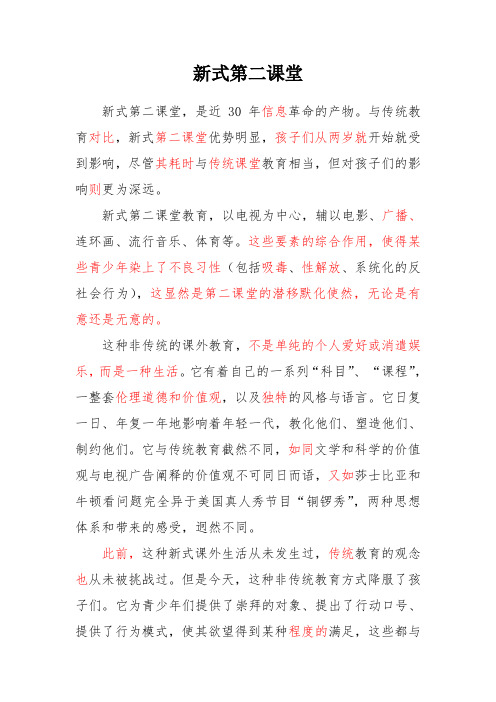
新式第二课堂新式第二课堂,是近30年信息革命的产物。
与传统教育对比,新式第二课堂优势明显,孩子们从两岁就开始就受到影响,尽管其耗时与传统课堂教育相当,但对孩子们的影响则更为深远。
新式第二课堂教育,以电视为中心,辅以电影、广播、连环画、流行音乐、体育等。
这些要素的综合作用,使得某些青少年染上了不良习性(包括吸毒、性解放、系统化的反社会行为),这显然是第二课堂的潜移默化使然,无论是有意还是无意的。
这种非传统的课外教育,不是单纯的个人爱好或消遣娱乐,而是一种生活。
它有着自己的一系列“科目”、“课程”,一整套伦理道德和价值观,以及独特的风格与语言。
它日复一日、年复一年地影响着年轻一代,教化他们、塑造他们、制约他们。
它与传统教育截然不同,如同文学和科学的价值观与电视广告阐释的价值观不可同日而语,又如莎士比亚和牛顿看问题完全异于美国真人秀节目“铜锣秀”,两种思想体系和带来的感受,迥然不同。
此前,这种新式课外生活从未发生过,传统教育的观念也从未被挑战过。
但是今天,这种非传统教育方式降服了孩子们。
它为青少年们提供了崇拜的对象、提出了行动口号、提供了行为模式,使其欲望得到某种程度的满足,这些都与课堂教育完全不同。
这是历史上首次让孩子们熟谙两种文化,即传统课堂生活和新式课外生活。
忠诚于两种文化这种划分会产生能观察到的混乱这种想法怪异吗?(说人话!)。
从深层次考虑,所有的孩子(某种程度上,包括我们的老师,父母和我们自己)都患有精神分裂症。
因为一方面是课本上倡导的观念及传统思想文化阐释的现实生活,另一方面是电视、摇滚歌星和奉行即时感觉、即时满足和即时消费的“宗教”信条阐释的生动的、可理解的虚拟现实。
如果我们寻根问底地追问教师们:摆在他们面前的最大困惑是什么,他们几乎都会认为是新式课外生活对课堂教育的冲击。
因为从未被传授过应对之策,面对此种冲击,教师们无计可施。
新式课外生活有一种特殊的心理效应困扰着教师,无论是教授写作课的教师还是教授其他基本课程的教师。
第十届“中国海洋大学—《英语世界》杯

第十届“中国海洋大学—《英语世界》杯”翻译大赛XX及原文“《英语世界》杯”翻译大赛肇始于2021 年,由商务印书馆《英语世界》XX 社主办。
短短数载,大赛参赛人数屡创新高,目前已经成为国内最有影响的翻译赛事之一。
为推动翻译学科进一步,促进中外文化交流,我们秉承“给力英语学习,探寻翻译之星”的理念,于2021年继续举办第十届“《英语世界》杯"翻译大赛,诚邀广大翻译爱好者积极参与,比秀佳译。
第十届“《英语世界》杯”翻译大赛得到中国海洋大学的大力支持,并由该校冠名本届比赛.2021年的翻译大赛包含“英译汉”和“汉译英”两个组别.大赛初评交给合办院校的老师,以确保大赛评审的权威性和公信力。
复评和终评我们将延续历届传统,从全国XX地邀请知名翻译专家进行评审。
合办院校中国海洋大学外国语学院赞助单位UXXXXre EducationXX韬略教育科技有限XX旗下品牌,秉承“您身边的留学专家”的理念,开展包括XX、XX、加拿大、、新西兰、XX等主流留学XX的留学申请及游学服务.UXXXXre核心成员毕业于世界名校,拥有申请牛津、剑桥、哈佛、斯坦福等大学的丰富经验,深谙欧美名校录取之道,迄今已助力上万名学生实现世界名校梦.协办单位中国翻译协会XX科学翻译XX中国外文局翻译专业资格考评中心中国英汉语比较研究会英汉翻译研究学科XXXX省翻译协会XX省翻译协会XX省翻译理论与教学研究会XX省翻译协会XX省翻译协会XX通译翻译有限XX《外语与翻译》编辑部英文巴士网赛程及评审1. 2021年5月发布大赛XX及原文,10月公布获奖结果,见诸以下XX:《英语世界》2021年第5期(XX及原文)和第10期(获奖结果等)、《英语世界》XX(www。
yingyushijie。
XX)、《英语世界》XX公众平台(XX号:theworldofenglish)、《英语世界》XX方微博(weibo。
XX/theworl dofenglish)、中国海洋大学外国语学院XX(flc。
第十届全国英语演讲比赛7到10名作文
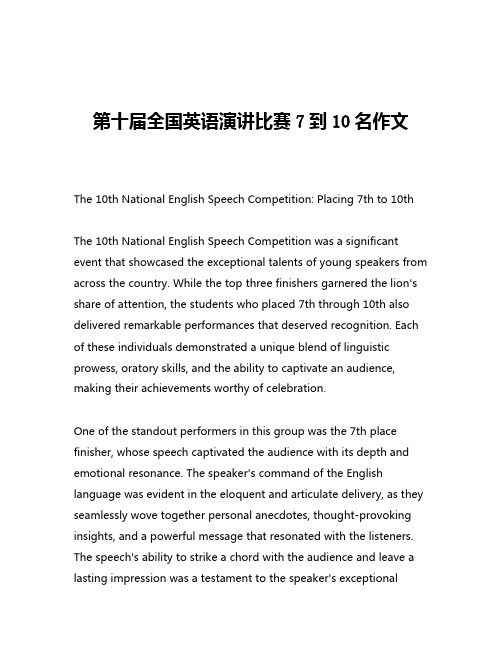
第十届全国英语演讲比赛7到10名作文The 10th National English Speech Competition: Placing 7th to 10thThe 10th National English Speech Competition was a significant event that showcased the exceptional talents of young speakers from across the country. While the top three finishers garnered the lion's share of attention, the students who placed 7th through 10th also delivered remarkable performances that deserved recognition. Each of these individuals demonstrated a unique blend of linguistic prowess, oratory skills, and the ability to captivate an audience, making their achievements worthy of celebration.One of the standout performers in this group was the 7th place finisher, whose speech captivated the audience with its depth and emotional resonance. The speaker's command of the English language was evident in the eloquent and articulate delivery, as they seamlessly wove together personal anecdotes, thought-provoking insights, and a powerful message that resonated with the listeners. The speech's ability to strike a chord with the audience and leave a lasting impression was a testament to the speaker's exceptionalcommunication skills and their ability to connect with people on a deeper level.The 8th place finisher, on the other hand, impressed the judges and the audience with their remarkable versatility and adaptability. Throughout the competition, this individual demonstrated the ability to tackle a wide range of topics with ease, showcasing their breadth of knowledge and their capacity to engage the audience with their unique perspectives. Whether discussing complex social issues or sharing personal experiences, the 8th place finisher consistently delivered speeches that were both informative and captivating, leaving a lasting impact on all who witnessed their performance.In the 9th place, the competitor's speech stood out for its innovative approach and the ability to challenge the status quo. The speaker's willingness to tackle unconventional topics and present fresh, thought-provoking ideas was a testament to their intellectual curiosity and their desire to push the boundaries of traditional public speaking. The speech's ability to provoke deep reflection and encourage the audience to consider new perspectives was a testament to the speaker's exceptional critical thinking skills and their commitment to fostering meaningful dialogue.Finally, the 10th place finisher captivated the audience with their remarkable poise and confidence. Throughout the competition, thisindividual demonstrated an unwavering stage presence and the ability to command the attention of the room, even in the face of the intense pressure and scrutiny that comes with such a high-profile event. The speaker's ability to deliver their message with clarity, conviction, and a genuine connection with the audience was a testament to their exceptional public speaking skills and their commitment to honing their craft.Collectively, the students who placed 7th through 10th in the 10th National English Speech Competition exemplified the depth and breadth of talent that exists among the youth of our nation. Each of these individuals brought their unique strengths and perspectives to the stage, showcasing the incredible diversity of thought and expression that can be found in our young people. Whether it was the emotional resonance of the 7th place finisher, the versatility of the 8th place competitor, the innovative approach of the 9th place speaker, or the poise and confidence of the 10th place finisher, these students demonstrated the remarkable potential that exists within the next generation of leaders, thinkers, and communicators.As we look to the future, it is clear that the students who placed 7th through 10th in the 10th National English Speech Competition are poised to make significant contributions to their communities and to the world at large. Their exceptional abilities, coupled with their passion for learning, growth, and making a positive impact, are thefoundations upon which they can build successful and fulfilling careers, while also serving as inspirations to their peers and role models for the generations that will follow.In conclusion, the achievements of the students who placed 7th through 10th in the 10th National English Speech Competition are a testament to the incredible talent and potential that exists within our youth. Their remarkable performances not only showcased their individual strengths but also highlighted the depth and diversity of the next generation of leaders, thinkers, and communicators. As we look to the future, it is clear that these young individuals are poised to make a lasting impact on the world, and we should celebrate and support their continued growth and development.。
- 1、下载文档前请自行甄别文档内容的完整性,平台不提供额外的编辑、内容补充、找答案等附加服务。
- 2、"仅部分预览"的文档,不可在线预览部分如存在完整性等问题,可反馈申请退款(可完整预览的文档不适用该条件!)。
- 3、如文档侵犯您的权益,请联系客服反馈,我们会尽快为您处理(人工客服工作时间:9:00-18:30)。
江苏科技大学第十届翻译大赛英译汉竞赛原文Bob Dylan, Bill Murray and Henry Kissinger: Whenhonorees don’t want their prizeOn Sunday night, the ever-elusive Bill Murray is expected to take the stage at the Kennedy Center and accept the Mark Twain Prize for American Humor, an award he actively avoided receiving. Last week he told The Washington Post’s Geoff Edgers, “I really thought if I don’t answer the phone for awhile, maybe they’ll just move on to someone else.”They didn’t. They called and called, and then had other people call, and eventually, Murray gave in.This month, the same tactic was used by the Swedish Academy, who is responsible for awarding the Nobel prizes. Bob Dylan won the prize for Literature. The Academy called his manager. The press called his representatives. Dylan has yet to say a word. “One can say that it is impolite and arrogant. He is who he is,” one of the Academy members told the Swedish newspaper Dagens Nyheter this week.When the prize is bestowed on Dec. 10, it appears there’s a good chance Dylan won’t show up. So will he still get to become the first musician to receive the Nobel for literature?If the Academy follows the precedent set by the many award-giving institutions that have been snubbed throughout history, the answer is yes. In the world of prestigious prizes, the honor is yours whether you like it or not. Pick any well-known award, and there’s a good chance its chosen winners haven’t all deigned to make themselves available for the ceremony. For some, the snub is a statement. When Marlon Brando won an Academy Award for “The Godfather,” he boycotted the ceremony and sent a Native American actress named Sacheen Littlefeather in his place. She took the stage, waved away the award and told the audience that Brando couldn’t accept the award because of the treatment of American Indians by the film industry.Others seem to have little interest in the theatrics that usually surround award acceptance. Katharine Hepburn won four Oscars, but never showed up to claim them. “As for me, prizes are nothing,” she once said. “My prize is my work.” Woody Allenwon’t show up to the Oscars, either. His biographer Eric Lax told NPR that’s b ecause Allen, like his character in “Annie Hall,” quotes Sigmund Freud: “I would never want to belong to any club that would have someone like me for a member.”Some famous snubbers give no reasoning. Maggie Smith has been nominated for nine Emmys, and has won four times. She’s never showed up. When this year’s Emmy host Jimmy Kimmel announced another Smith win this year, he said, “Maggie, if you want this, it will be in the lost and found.” The 81-year-old Smith responded via a PBS Twitter account: “If Mr.Kimmel could please direct me to the lost and found office I will try and be on the next flight.”The world of Nobel prizes is far less star-studded than that of entertainment awards, but it’s hardly free of cold shoulders. The most notable came in 1973, when the Peace Prize was awarded to Vietnamese politician Le Duc Tho and then-U.S. Secretary of State Henry Kissinger, who negotiated a cease-fire agreement meant to bring about an end to the Vietnam War. But the conflict was two years away from ending. Awarding Tho and Kissinger the prize was so controversial, two members of the Nobel selection committee resigned in protest. Vietnam’s Tho refused it outright. Kissinger didn’t show at the ceremony, and tried to return the medal.But not once in the Nobe l committee’s 115-year history has it allowed a prize to be revoked or returned. Once it’s awarded, it’s awarded for life. In the case of Dylan, this history hasn’t stopped naysayers from calling for a do-over. While Dylan has showed up to accept awards in the past —including the Presidential Medal of Freedom — now, he seems to have no interest. Why give a prize to someone who doesn’t want it?His fans see his indifference as a charming characteristic of his mysterious persona. His critics hold it up as just another reason why a man so prominent shouldn’t have been chosen in the first place.“Bob Dylan now has a chance to do something truly great for literature: reject the Nobel Prize for Literature,” poet Amy King expressed to PEN America, a writers association. “He can take a stand and declare that fame and ease of consumption should not play a role in determining merit when it comes to focusing the public eye on one writer’s books.” Dylan certainly could try to reject the prize. But first, he’d have to acknowledge that he won it. (779字)汉译英竞赛原文请你把脚步放轻些一个人要赢得人们的尊敬,绝不是靠权威、靠装潢、靠强迫就能得到的。
